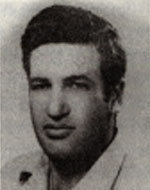Tzalmon, David
David, son of Lulu and Salman, was born in Baghdad in 1944. In 1951, his family immigrated to Israel and settled in the Har Tuv transit camp, where David studied at the Jimmy Elementary School in Beit Shemesh. He continued to study at Kibbutz Palmach Tzuba. Despite the difficult living conditions in the transit camp and despite the family’s difficult financial situation, David made sure to visit the school regularly and was among the best students in his class. For several years the family lived in tin shacks without basic services, without running water and without electricity. In addition to the usual difficulties, which stemmed from a foreign language and a new environment, economic difficulties were added. He was careful to appear clean and dressed neatly. His success in school was so great that many of his classmates would come to his house to help him and do homework with him. At the end of his studies at elementary school, he decided to combine studies with work and joined with his good friend to the youth group of Kibbutz Palmach Tzuba in the Jerusalem hills, immediately absorbed by the orchards and the boys. Even before the end of the trial period, David was elected to the cultural committee of the youth society and played a central role in all social events, most of which he initiated himself, and in the few leisure hours he had left, he enthusiastically dealt with the chess game and nurtured his collection of stamps. He was still in elementary school. Every penny he managed to save from the vacation pay he paid to buy new stamps for his collection, and all the letters that were sent to the agriculture were first handed to David, who would take the stamps off the envelopes and then transfer them to their destination. In his stamp collection he invested a great deal of energy and a desire to learn chess, thanks to his serious and thorough approach and his quick grasp of many victories, slowly becoming an expert in this field and in the chess competition that the agriculture organized to succeed in scoring against the master Czerniak. David’s integration into the agriculture was so complete that he decided to spend all his youth there until his enlistment in the IDF, and David was drafted into the IDF in mid-October 1958 and volunteered for the infantry. He completed his basic training with honors and was trained in machine gun training, and as a disciplined soldier and an effective combat soldier, his commanders sent him to a course for squad commanders and was also very successful there, especially in the training course and in reading the map and in the field. During the Yom Kippur War, David participated in the braking battles that our forces conducted from the outposts along the Suez Canal. On the 10th of Tishrei 5734 (October 6, 1973), David was injured during the fighting in the “Ktuf” stronghold, and was brought to eternal rest in the Mount Herzl cemetery in Jerusalem, leaving behind a wife and four sons and daughters.
